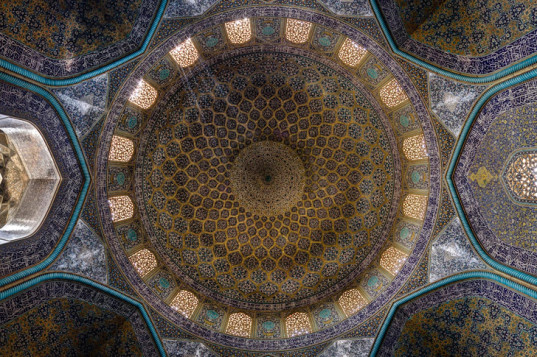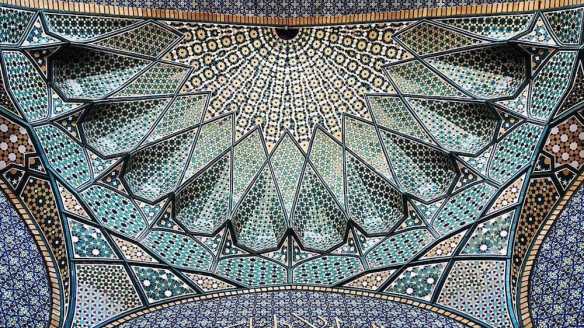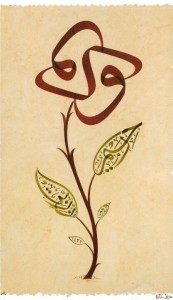

Qu’ran 2:144
We have seen the turning of thy face to heaven. And now verily We shall turn you toward a qibla [direction of prayer] which is dear to thee. So turn thy face toward the Inviolable Place of Worship, and ye, wheresoever ye may be, turn your faces toward it. Lo! Those who have received the Scripture know that is the Truth from their Lord. And Allah is not unaware of what they do.

Qur’an 10:87
We revealed to Moses and his brother, “Appoint houses for your people in Egypt and make your houses a qibla [direction of prayer], and establish worship. And give good news to the believers.”

Qur’an 2:155
To god belong the East and West, and wheresoever you turn, there is the face of God.
“Do you think my qibla is only here [before me]? By God, your bowing and prostrating are not concealed from me; I can see you even though you are behind my back.”
-Hadith


Rumi
Since the qibla of the soul has been hidden
everyone has turned his face to a different corner
(Masnavi 5:328-337)
Original:
قبلهی جان را چو پنهان کردهاند
هر کسی رو جانبی آوردهاند
The Kaaba of Gabriel and the celestial spirits is a Lote-tree;
the glutton’s qibla is a cloth laden with dishes of food.
The qibla of the Knower is the light of union with God;
the qibla of the philosopher’s mind is fantasy.
The qibla of the ascetic is God, the Gracious;
the qibla of the flatterer is a purse of gold.
The qibla of the spiritual is patience and long-suffering;
the qiblah of form-worshippers is an image of stone.
The qibla of those who live in the inward is the Bounteous One;
the qibla of those who worship the outward is a woman’s face.
(Masanvi 6, 1896–1900)
Original:
کعبهی جبریل و جانها سدرهای ** قبلهی عبدالبطون شد سفرهای
قبلهی عارف بود نور وصال ** قبلهی عقل مفلسف شد خیال
قبلهی زاهد بود یزدان بر ** قبلهی مطمع بود همیان زر
قبلهی معنیوران صبر و درنگ ** قبلهی صورتپرستان نقش سنگ
قبلهی باطننشینان ذوالمنن ** قبلهی ظاهرپرستان روی زن
By virtue of that Light the calf becomes a qibla of grace;
without that Light the qibla becomes infidelity and an idol.
The licence that comes from self-will is error;
the licence that comes from God is perfection.
In that quarter where the illimitable Light has shone,
infidelity has become faith and the Devil has attained unto Islam.
Original:
عجل با آن نور شد قبلهی کرم ** قبله بی آن نور شد کفر و صنم
هست اباحت کز هوای آمد ضلال ** هست اباحت کز خدا آمد کمال
کفر ایمان گشت و دیو اسلام یافت ** آن طرف کان نور بیاندازه تافت
(Masnavi 6: 2073)
Within the Ka‘ba the rule of the qibla does not exist:
what matter if the diver has no snow-shoes?
Do not seek guidance from the drunken:
why dost thou order those whose garments are rent in pieces to mend them?
The religion of Love is apart from all religions:
for lovers, the (only) religion and sect is God.
Original:
در درون کعبه رسم قبله نیست ** چه غم ار غواص را پاچیله نیست
تو ز سر مستان قلاووزی مجو ** جامه چاکان را چه فرمایی رفو
تو ز سر مستان قلاووزی مجو ** جامه چاکان را چه فرمایی رفو
ملت عشق از همه دینها جداست ** عاشقان را ملت و مذهب خداست
(Masnavi 6:1768-1770)
Since the Hand of God has made the Qibla manifest,
henceforth deem searching to be disallowed.
Hark, avert your face and head from searching,
now that the Destination and Dwelling-place has come into view.
If you forget this Qibla for one moment, you will become in thrall to every worthless qibla (object of desire).
When you show ingratitude to him that gives you discernment, the thought that recognises the Qibla will dart away from you.
Original:
قبله را چون کرد دست حق عیان ** پس تحری بعد ازین مردود دان
هین بگردان از تحری رو و سر ** که پدید آمد معاد و مستقر
ک زمان زین قبله گر ذاهل شوی ** سخرهی هر قبلهی باطل شوی
چون شوی تمییزده را ناسپاس ** بجهد از تو خطرت قبلهشناس
Amīr Khusrow
Every sect has a faith, a Qibla to which they turn,
I have turned my face towards the crooked cap (of Nizamudin Aulia)
The whole world worships something or the other,
Some look for God in Mecca, while some go to Kashi (Banaras),
So why can’t I, Oh wise people, fall into my beloved’s feet?
Every sect has a faith, a Qibla.
Original:
هر قوم راست راهي، ديني و قبله گاهي
من قبله راست كرديم ،بر سمت كج كلاهي
…
Transliteration:
Har qaum raast raahay, deen-e wa qibla gaahay,
Mun qibla raast kardam, bar samt kajkulaahay.
Sansaar har ko poojay, kul ko jagat sarahay,
Makkay mein koyi dhoondhay, Kaashi ko koi jaaye,
Guyyian main apnay pi kay payyan padun na kaahay.
Har qaum raast raahay, deen-e wa qibla gaahay…
Mirza Ghālib
The one to whom I bow is beyond senses’ boundaries
The qiblah itself’s a pointer for those who can see
Original:
ہے پرے سرحدِ ادراک سے اپنا مسجود
قبلے کو اہلِ نظر قبلہ نما کہتے ہیں

Ibn ‘Arabi:
Contemplate the house: for sanctified hearts,
its lights shine openly
They look at it through God, without a veil,
and its august and sublime secret appears to them.
and famously:
My heart has become receptive to every form
A meadow for gazelles, and a cloister for the monks
A house for the idols, and the pilgrim’s Ka’aba
The tablets of the Torah, pages of the Qur’an
My religion is love’s own and wheresoever turn
Her caravan, that love is my religion and my faith
We have an example in Bishr, lover of Hind and her sister,
And Qays and Layla, and Mayya and Ghaylan*
Original:
لقدْ صارَ قلبي قابلاً كلَّ صورة ٍ فمَرْعًى لغِزْلاَنٍ وديرٌ لرُهْبانِ
وبَيْتٌ لأوثانٍ وكعبة ُ طائفٍ، وألواحُ توراة ٍ ومصحفُ قرآنِ
أدينُ بدينِ الحبِّ أنَّى توجَّهتْ رَكائِبُهُ فالحُبُّ ديني وإيماني
لنا أُسْوَة ٌ في بِشْرِ هندٍ وأُخْتِهَا وقيسٍ وليلى ، ثمَّ مي وغيلانِ
Also see:
https://ibnarabisociety.org/the-paradox-of-the-kaaba-michel-chodkiewicz/
and
The perhaps most obvious poetic lines to cite are Rūmī's:
The qibla of the glutton,
that is the table-cloth.
The qibla for the gnostic:
the light of union with God,
…
The qibla of those who worship
the form: an image of stone
…— tibaq (@TTibaq) March 25, 2022
Amīr Khusrau:
هر قوم راست راهي، ديني و قبله گاهي
ما قبله راست كرديم ،بر سمت كج كلاهيContra Ghalib:
ہے پرے سرحدِ ادراک سے اپنا مسجود
قبلے کو اہلِ نظر قبلہ نما کہتے ہیں— tibaq (@TTibaq) March 25, 2022
“”For my purposes, religion will mean orientation—orientation in the ultimate sense, that is, how one comes to terms with the ultimate significance of one’s place in the world.”
David Foster Wallace, “This is Water”:
“Everybody worships. The only choice we get is what to worship. And the compelling reason for maybe choosing some sort of god or spiritual-type thing to worship–be it JC or Allah, be it YHWH or the Wiccan Mother Goddess, or the Four Noble Truths, or some inviolable set of ethical principles–is that pretty much anything else you worship will eat you alive. If you worship money and things, if they are where you tap real meaning in life, then you will never have enough, never feel you have enough. It’s the truth. Worship your body and beauty and sexual allure and you will always feel ugly. And when time and age start showing, you will die a million deaths before they finally grieve you. On one level, we all know this stuff already. It’s been codified as myths, proverbs, clichés, epigrams, parables; the skeleton of every great story. The whole trick is keeping the truth up front in daily consciousness.
Worship power, you will end up feeling weak and afraid, and you will need ever more power over others to numb you to your own fear. Worship your intellect, being seen as smart, you will end up feeling stupid, a fraud, always on the verge of being found out. But the insidious thing about these forms of worship is not that they’re evil or sinful, it’s that they’re unconscious. They are default settings.
They’re the kind of worship you just gradually slip into, day after day, getting more and more selective about what you see and how you measure value without ever being fully aware that that’s what you’re doing.
And the so-called real world will not discourage you from operating on your default settings, because the so-called real world of men and money and power hums merrily along in a pool of fear and anger and frustration and craving and worship of self. Our own present culture has harnessed these forces in ways that have yielded extraordinary wealth and comfort and personal freedom. The freedom all to be lords of our tiny skull-sized kingdoms, alone at the centre of all creation. This kind of freedom has much to recommend it. But of course there are all different kinds of freedom, and the kind that is most precious you will not hear much talk about much in the great outside world of wanting and achieving…. The really important kind of freedom involves attention and awareness and discipline, and being able truly to care about other people and to sacrifice for them over and over in myriad petty, unsexy ways every day.
That is real freedom. That is being educated, and understanding how to think. The alternative is unconsciousness, the default setting, the rat race, the constant gnawing sense of having had, and lost, some infinite thing.”
-David Foster Wallace




































































































